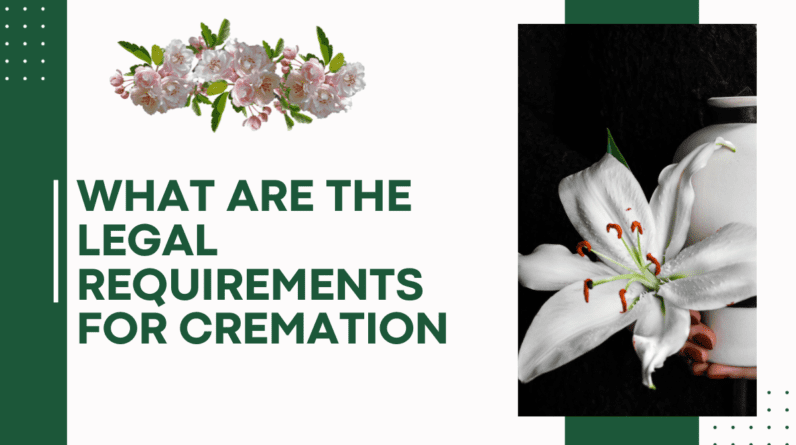
Are you considering cremation for your loved one in Melbourne, FL? It’s important to familiarize yourself with the legal requirements surrounding this process. In this article, we will outline the necessary steps and regulations to ensure a smooth and lawful cremation in Melbourne, FL. From obtaining the proper documentation to understanding the local guidelines, we’ve got you covered. Read on to discover everything you need to know about the legal requirements for cremation in Melbourne, FL.

Overview of Cremation in Melbourne, FL
What is cremation?
Cremation is a method of disposition that involves the burning of a deceased body into ashes. It is an alternative to traditional burial and has gained popularity in recent years. During the process of cremation, the body is placed in a specialized chamber called a cremation retort, where it is subjected to intense heat and flames. This causes the body to be reduced to bone fragments and ashes, which are then carefully collected and placed in an urn.
Why choose cremation?
There are several reasons why people choose cremation as a method of disposition. One of the main reasons is cost-effectiveness. Cremation generally costs less than traditional burials, as it eliminates the need for expensive caskets, burial plots, and associated services. Additionally, cremation offers more flexibility in terms of memorialization options. Families can choose to scatter the ashes in a meaningful location, keep them in an urn at home, or even turn them into memorial jewelry. Cremation also has a smaller environmental impact compared to burial, making it a more eco-friendly choice for those concerned about their carbon footprint.
Cremation process
The cremation process involves several steps to ensure the respectful handling of the deceased. Once all necessary legal requirements are met, the body is transported to a licensed crematorium. Upon arrival, the body is properly identified and prepared for cremation. It is then placed in the cremation retort, which reaches temperatures of up to 2,000 degrees Fahrenheit. The body is subjected to this intense heat for a few hours until only bone fragments remain. These fragments are then carefully removed from the retort and processed into fine ashes using specialized equipment. The ashes are subsequently placed in an urn and returned to the family or disposed of in accordance with the deceased’s wishes.
Environmental impact of cremation
Cremation is generally considered to have a smaller environmental impact compared to traditional burial practices. Cremation eliminates the need for land use, as there is no requirement for a burial plot. This reduces the demand for resources and protects natural habitats. Additionally, cremation does not require embalming, which avoids the use of chemicals that could potentially harm the environment. However, it’s important to note that the process of cremation does release carbon dioxide and other pollutants into the atmosphere. Some crematoriums have taken steps to mitigate their environmental impact by implementing carbon offset programs or using cleaner energy sources during the cremation process.
Legal Requirements for Cremation
Authorization for cremation
Before cremation can take place, it is necessary to obtain authorization from the legal next of kin or the person responsible for making funeral arrangements. This can be done through a written document, such as a cremation authorization form, which grants permission for the body to be cremated. In cases where the deceased has expressed their wishes for cremation in their will, additional documentation may be required to validate their wishes.
Death certificate
A death certificate is another legal requirement for cremation. The death certificate serves as proof of the individual’s passing and includes important information such as cause of death, date and place of death, and personal details of the deceased. This document is usually issued by a medical professional or a coroner and is required for various legal purposes, including the authorization of cremation.
Cremation permit
In addition to the authorization and death certificate, a cremation permit is needed to proceed with the cremation process. The cremation permit is typically issued by the local health department or the coroner’s office and grants permission for the body to be cremated. The permit ensures that all legal requirements and regulations are met before the cremation takes place.
Obtaining necessary documents
To fulfill the legal requirements for cremation, it is advisable to work closely with a licensed funeral home or cremation provider. They can assist in obtaining the necessary documents and guide you through the entire process. Funeral homes are experienced in navigating the legalities surrounding cremation and can ensure that all paperwork is completed accurately and in a timely manner.
Cremation timeframe
The timeframe for the cremation process can vary depending on several factors, including the availability of the crematorium and the completion of legal requirements. In Melbourne, FL, it is recommended to allow a minimum of 48 hours between the time of death and the scheduled cremation. This allows sufficient time to obtain the necessary authorization, death certificate, and cremation permit. It is important to consult with the chosen cremation provider to understand their specific timeframe and any additional requirements they may have.
Choosing a Cremation Provider
Licensed cremation providers
When selecting a cremation provider, it is essential to choose a licensed and reputable establishment. Licensed providers adhere to strict regulations and have undergone proper training to ensure the dignified and lawful handling of the deceased. By selecting a licensed provider, you can have peace of mind knowing that the cremation process will be carried out professionally and in accordance with local laws and regulations.
Comparing service offerings
Before making a decision, it is beneficial to compare the service offerings of different cremation providers. Some providers may offer additional services such as memorial ceremonies, grief support, or assistance with post-cremation arrangements. Consider your individual needs and preferences when evaluating the different options available.
Pricing transparency
Transparency in pricing is crucial when choosing a cremation provider. Request a detailed price list that clearly outlines the costs associated with the cremation process and any additional services you may require. This will allow you to make an informed decision and avoid any unexpected financial burdens.
Cremation options available
Cremation offers a variety of options for memorialization and final disposition. Discuss with the chosen cremation provider the different choices available, such as scattering the ashes at sea or in a meaningful location, burying the ashes in a cemetery, or placing them in a columbarium or mausoleum. Understanding the range of options will help you make an informed decision that aligns with the deceased’s wishes and your own preferences.
Fulfilling the Deceased’s Wishes
Preplanning and prepayment
To ensure that the deceased’s wishes regarding cremation are fulfilled, it is advisable to consider preplanning and prepayment options. Preplanning allows individuals to make their intentions known in advance, easing the decision-making process for their loved ones. Prepayment allows for the financial aspects of cremation to be taken care of ahead of time, relieving the burden from family members during an already difficult time.
Funeral planning considerations
When planning a funeral or memorial service alongside cremation, there are various factors to consider. Take into account the religious or cultural traditions of the deceased, as well as any personal preferences they may have expressed. Consult with family members and close friends to ensure that the chosen arrangements accurately reflect the life and values of the deceased.
Religious and cultural considerations
Cremation is generally accepted across a wide range of religious and cultural practices. However, it is important to be aware of any specific guidelines or restrictions that may apply. Some religions may have specific rituals or requirements regarding cremation, and it is essential to respect and adhere to these beliefs. Consult with religious leaders or cultural advisors for guidance and support in navigating these considerations.
Transportation and Handling of Remains
Transporting the deceased
Transporting the deceased to the crematorium is a crucial aspect of the cremation process. Depending on the circumstances, this may involve coordination between the funeral home, cremation provider, and transportation services. Licensed professionals should handle the transportation to ensure that the remains are treated with the utmost care, respect, and dignity.
Proper handling and identification of remains
Throughout the entire cremation process, proper handling and identification of the remains are paramount. Strict protocols should be in place to ensure that the remains are correctly labeled and tracked at every stage. This ensures that the ashes returned to the family are indeed those of their loved one. Licensed cremation providers prioritize accuracy and take appropriate measures to maintain the integrity of the process.
Cremation Process and Facility
Cremation retort and equipment
The cremation process is carried out using specialized equipment, including a cremation retort. The retort is a chamber specifically designed for the purpose of cremation and is capable of withstanding extreme temperatures. The equipment within the retort, such as burners and filters, is carefully maintained and regularly inspected to ensure optimal functionality and safety.
Cremation process steps
The cremation process involves several steps to ensure a respectful and thorough process. Once the body is placed in the retort, it is subjected to intense heat and flames, gradually reducing it to bone fragments. After the completion of the cremation, the bone fragments are carefully removed from the retort and processed into fine ashes using specialized equipment. These ashes are then placed in an urn and returned to the family or handled according to the deceased’s wishes.
Crematorium regulations and inspections
Crematoriums are subject to regulations and inspections to ensure compliance with local laws and guidelines. Regular inspections are conducted to assess the cleanliness, safety, and operational standards of the facility. By choosing a licensed cremation provider, you can trust that they operate within the required regulations, providing peace of mind during this difficult time.
Disposal of Cremated Remains
Scattering of ashes
Scattering the ashes in a meaningful location is a popular choice for many families. This can be done in a designated scattering garden, at the deceased’s favorite place, or in accordance with any specific wishes they may have expressed. Some families choose to hold a ceremony or gathering during the scattering process to honor the memory of their loved one.
Burial of ashes
For individuals who prefer a more traditional approach, the burial of ashes is another option. Ashes can be interred in a cemetery plot and marked with a memorial plaque or headstone. This provides a permanent place of remembrance for family and friends to visit and pay their respects.
Columbarium and mausoleum options
Columbariums and mausoleums offer an alternative to traditional burial, providing a dedicated space for the storage of urns containing ashes. These structures can be found in cemeteries, churches, or other religious institutions. They offer a secure and dignified resting place for the deceased, with the option of personalizing the space with photographs or memorabilia.
Responsibilities and Liabilities
Funeral home and crematory responsibilities
Funeral homes and crematories have a responsibility to fulfill the wishes of the deceased and their family with the utmost care and compassion. This includes the correct handling and disposition of the body, accurate completion of legal documents, and adherence to all local regulations and requirements. Licensed providers prioritize professionalism and maintain the highest ethical standards throughout the cremation process.
Liabilities and legal obligations
Licensed cremation providers carry the necessary insurance and adhere to legal obligations to protect the interests of their clients. However, it is important for family members to understand their rights and responsibilities as well. It is advisable to carefully review any contracts or agreements before engaging the services of a cremation provider to ensure that all details and potential liabilities are clearly understood.
Legal Considerations for Medical or Legal Intervention
Medical examiner involvement
In cases where the cause of death is unclear or requires further investigation, the involvement of a medical examiner may be necessary. The medical examiner performs an autopsy or other relevant examinations to determine the cause and manner of death. Once their investigations are complete and any necessary legal requirements are met, the body can be released for cremation.
Coroner’s approval
In certain situations, the approval of a coroner may be required before cremation can proceed. The coroner reviews the circumstances surrounding the death and ensures that there are no suspicious or unusual circumstances that require further investigation. Their approval is necessary to ensure that all legal requirements are met and that the cremation can be carried out without any obstacles.
Legal requirements for cremating a body
Cremating a body involves complying with various legal requirements to ensure that the process is conducted lawfully and respectfully. These requirements may include obtaining authorization from the legal next of kin, completing the necessary legal documents, and securing the appropriate permits. By working with a licensed cremation provider, you can rely on their expertise to guide you through the legal aspects and ensure compliance with all regulations.
Additional Considerations
Scattering ashes in public spaces
While scattering ashes in public spaces may symbolize a meaningful connection to the deceased, it is important to be aware of local regulations. Some areas may have restrictions on scattering ashes in public or private property. It is advisable to check with local authorities or seek legal advice to ensure that you are complying with any applicable laws or regulations.
Complying with local regulations
To ensure a smooth and lawful cremation process, it is essential to comply with all local regulations and requirements. Each state and municipality may have specific guidelines, permits, and documentation necessary for cremation. Working with a licensed cremation provider who is well-versed in the local regulations ensures that all legal aspects are handled correctly and reduces the likelihood of any complications arising.
Funeral etiquette and respect for the deceased
Throughout the entire cremation process, it is essential to maintain a high level of funeral etiquette and respect for the deceased. This includes observing any religious or cultural traditions, treating the remains with care and dignity, and honoring the wishes of the deceased and their family. It is important to communicate openly and honestly with the chosen cremation provider to ensure that all personalized requests and requirements are met.
In conclusion, cremation in Melbourne, FL, offers a cost-effective and flexible alternative to traditional burial. By understanding the legal requirements, choosing a reputable cremation provider, and fulfilling the wishes of the deceased, you can ensure a respectful and meaningful cremation process. With careful consideration of environmental impact, transportation and handling of remains, and the range of memorialization options available, you can make informed decisions that honor your loved one’s memory. While navigating the legal and logistical aspects of cremation may seem overwhelming, working with a licensed cremation provider will provide the necessary guidance and support to ensure a seamless process.





